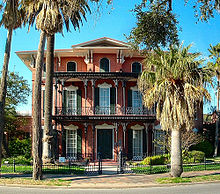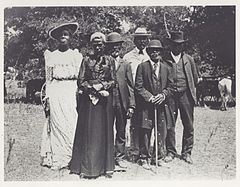Last Saturday our firm participated in the annual Austin parade celebrating Juneteenth, the day in 1864 it was announced in Texas that all slaves were free. The parade is the biggest in Austin, a celebration of freedom that has become a state holiday in Texas and 44 other states. June 19 also is my mother’s birthday.
Lincoln’s Emancipation Proclamation was issued on September 22, 1862, with an effective date of January 1, 1863. It declared that all slaves in the Confederate States would be free – excluding the five border states not in rebellion, and excluding the three zones then under Union occupation – Tennessee, lower Louisiana and Southeast Virginia.
Lee surrendered at Appomattox on April 9, 1864, but the Army of the Trans-Mississippi did not surrender until June 2. Union Army General Gordon Granger arrived on Galveston Island with 2,000 federal troops on June 18, to occupy Texas. The following day, from the balcony of Galveston’s Ashton Villa (see photo),  Granger read aloud General Order No. 3:
Granger read aloud General Order No. 3:
The people of Texas are informed that, in accordance with a proclamation from the Executive of the United States, all slaves are free. This involves an absolute equality of personal rights and rights of property between former masters and slaves, and the connection heretofore existing between them becomes that between employer and hired labor. The freedmen are advised to remain quietly at their present homes and work for wages. They are informed that they will not be allowed to collect at military posts and that they will not be supported in idleness either there or elsewhere.
 The following year, freedmen organized the first celebration of Juneteenth in Texas. Because African-Americans in come cities were barred from using public parks, freed people pooled their funds to purchase land on which to hold their celebrations, including Emancipation Park in Austin. As freed people immigrated to other states from Texas, Juneteenth celebrations spread. In 1980, Texas established Juneteenth as a state holiday. Congress recognized the day in 1977. The National Juneteenth Observance Foundation is seeking a Congressional designation of Juneteenth as a national day of observance.
The following year, freedmen organized the first celebration of Juneteenth in Texas. Because African-Americans in come cities were barred from using public parks, freed people pooled their funds to purchase land on which to hold their celebrations, including Emancipation Park in Austin. As freed people immigrated to other states from Texas, Juneteenth celebrations spread. In 1980, Texas established Juneteenth as a state holiday. Congress recognized the day in 1977. The National Juneteenth Observance Foundation is seeking a Congressional designation of Juneteenth as a national day of observance.
Photo above is from Juneteenth celebration in Austin in 1900.
 Oil and Gas Lawyer Blog
Oil and Gas Lawyer Blog



